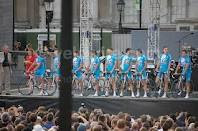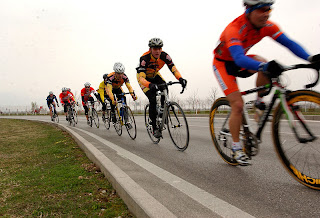Drafting:
Tactics are based on the aerodynamic benefit of drafting, whereby a rider can significantly reduce the required pedal effort by closely following in the slipstream of the rider in front. Riding in the main field, or peloton, can save as much as 40% of the energy employed in forward motion when compared to riding alone. Some teams designate a leader, whom the rest of the team is charged with keeping out of the wind and in good position until a critical section of the race. This can be used as a strength or a weakness by competitors; riders can cooperate and draft each other to ride at high speed (a paceline or echelon), or one rider can sit on a competitor's wheel, forcing him to do a greater share of the work in maintaining the pace and to potentially tire earlier. Drafting may not be employed in a time trial, unless it is a team time trial.
Breaks:
A group of riders that "breaks away" (a "break") from the peloton has more space and freedom, and can therefore be at an advantage in certain situations. Working together smoothly and efficiently, a small group can maintain a higher speed than the peloton, in which the remaining riders may not be as motivated or organized to chase effectively. Usually a rider or group of riders will try to break from the peloton by attacking and riding ahead to reduce the number of contenders for the win. If the break does not succeed and the body of cyclists comes back together, a sprinter will often win by overpowering competitors in the final stretch. Teamwork between riders, both pre-arranged and ad-hoc, is important in many aspects: in preventing or helping a successful break, and sometimes in delivering a sprinter to the front of the field.
Terrain and Conditions:
To make the course more selective, races often feature difficult sections such as tough climbs, fast descents, and sometimes technical surfaces (such as the cobbled pavé used in the Paris–Roubaix race). Also weather may be a discriminating factor. Stronger riders are able to drop weaker riders during such sections, reducing the number of direct competitors able to take the win.
Climbs:
Climbs are excellent places for a single rider to try and break away from a bunch, as the lower riding speeds in a climb seriously reduce the drafting advantage of the bunch. The escaping rider can then further capitalize on his position in the descent, as going downhill singly allows for more maneuvering space and therefore higher speeds than when in a bunch. In addition, because the bunch riders are keeping more space between them for safety reasons, their drafting benefits are again reduced. If this action takes place relatively close to the target (e.g. another bunch ahead, or the finish), the ride over flatter terrain after the descent is not long enough to let the drafting effect (which is then working at full power again) make the bunch catch up, making the escape successful.
Cross Winds:
Wind conditions can also make otherwise routine sections of a course potentially selective. Crosswinds, particularly, alter the position of the "shadow" when drafting a rider, usually placing it diagonally behind the lead rider. To take advantage of this, an attacking rider rides at high speed at the front of the peloton, on the opposite side of the road from which the crosswind is blowing. This tactic is known as "putting it in the gutter" in English. Following riders are unable to fully shelter from the wind. If such tactics are maintained for long enough, a weaker rider somewhere in the line will be unable to keep contact with the rider directly ahead, causing the peloton to split up. Taking advantage of crosswinds is a less prominent feature of Grand Tours for a variety of reasons, but are often decisive in one-day races, most notably in one-day classics in windswept Belgium and the Netherlands.
Speed:
As well as exceptional fitness, successful riders must develop excellent bike handling skills in order to ride at high speeds in close quarters with other riders. Individual riders can approach speeds of 110 km/h (68 mph) while descending winding mountain roads and may reach 60–80 km/h (37–50 mph) level speeds during the final sprint to the finish line.
Grupetto:
In more organized races, a SAG wagon ("Support And Gear") or Broom wagon follows the race to pick up stragglers. In professional stage racing, particularly the Tour de France, riders who are not in a position to win the race or assist a teammate, will usually attempt to ride to the finish within a specified percentage of the winner's finishing time, to be permitted to start the next day's stage. Often, riders in this situation band together to minimize the effort required to finish within the time limit; this group of riders is known as the "grupetto" or "autobus". In one-day racing, professionals who no longer have any chance to affect the race outcome will routinely withdraw, even if they are uninjured and capable of riding to the finish.
Cycling Road started in late 19th century and debuted in 1896 Olympic in Athens. Road Cycling is governed by Union Cycliste Internationale (UCI). 2012 Olympic will witness Road Cycling being competed from 28th july to 1st August at The Mall, Hampton Court where 212 (145 men, 67 women) athletes are participating.
for nominal prices.













